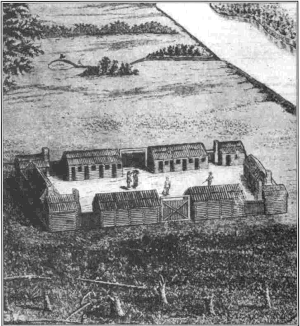Siege of Boonesborough
| Siege of Boonesborough | |||||||
|---|---|---|---|---|---|---|---|
| Part of the American Revolutionary War | |||||||
 Like other Kentucky forts, Fort Boonesborough comprised individual cabins which shared a common outer wall. |
|||||||
|
|||||||
| Belligerents | |||||||
| Kentucky settlers | Shawnees and allies | ||||||
| Commanders and leaders | |||||||
|
Daniel Boone, Richard Callaway, William Bailey Smith |
Blackfish, Antoine Dagneaux de Quindre, Moluntha |
||||||
| Strength | |||||||
| 135 settlers, (30–40 riflemen) |
444 Native Americans, 12 Detroit militia |
||||||
| Casualties and losses | |||||||
| 2 killed, 4 wounded |
37 killed, unknown wounded |
||||||
The Siege of Boonesborough took place in September 1778 during the American Revolutionary War. The attack on the Kentucky settlement of Boonesborough was led by Chief Blackfish, a Shawnee leader allied to the British. Months before the battle, Blackfish had captured and adopted Daniel Boone, the founder of Boonesborough. Boone escaped the Shawnees in time to lead the defense of the settlement. Blackfish's siege was unsuccessful and was lifted after ten days. Boone was then court-martialed by fellow officers who suspected him of having British sympathies. Boone was acquitted, but he soon moved away from Boonesborough.
In 1774, the British Colony and Dominion of Virginia defeated a coalition of Native Americans in the Ohio Country, primarily Shawnees, in Dunmore's War. In the treaty that ended the war, the Ohio River was established as the boundary between Shawnee lands north of the river and western Virginia (present West Virginia and much of Kentucky) to the south. The Native Americans were not unified, however, and many leaders did not recognize the treaty—which ceded their prime hunting grounds—to be binding.
In 1775, Richard Henderson of North Carolina purchased a large amount of Kentucky land from the Cherokees, who also hunted in Kentucky, on which he intended to establish a colony called Transylvania. Henderson's employee Daniel Boone blazed the Wilderness Trail into central Kentucky and built Fort Boone, soon renamed Boonesborough. Boonesborough and the rest of Transylvania became part of Virginia in 1776. Several families from the east soon settled there. Shawnees to the north were unhappy about American expansion into Kentucky, and they sporadically attacked Boonesborough.
...
Wikipedia
